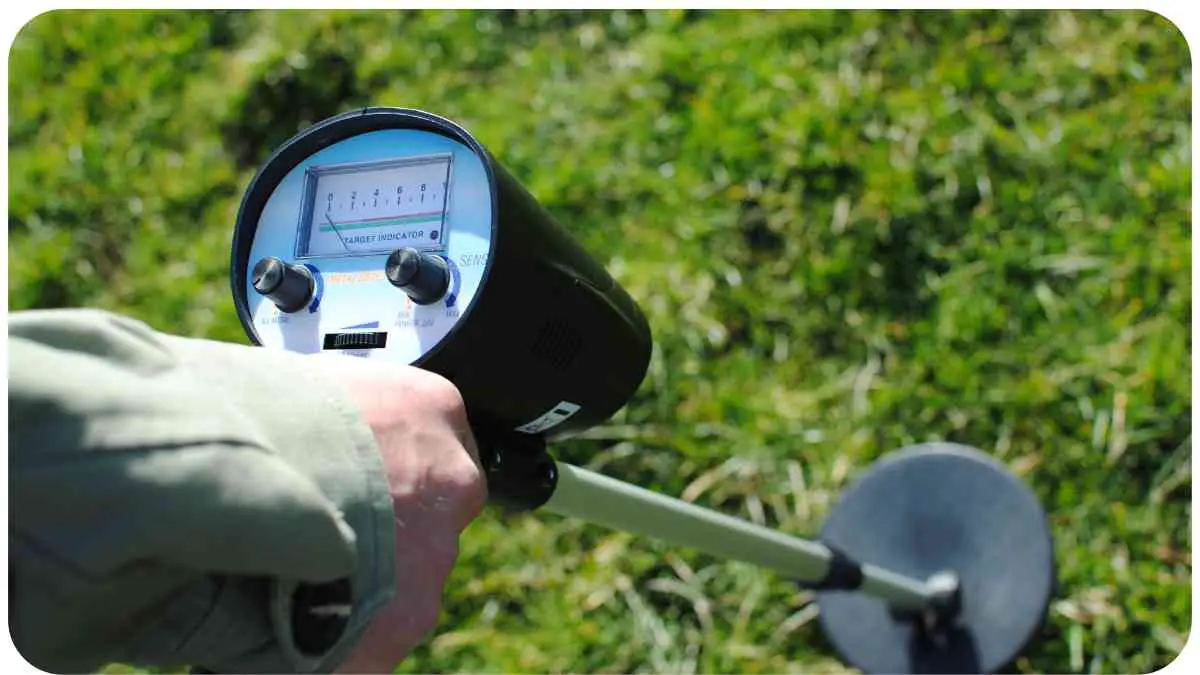Are you an avid treasure hunter or a metal detector enthusiast who loves exploring the outdoors in search of hidden treasures? If so, you must have encountered situations where your metal detector kept beeping continuously, even when no metal objects were nearby.
This frustrating experience can be caused by various factors, many of which can be easily fixed. In this article, we will discuss common issues that can trigger false positives in metal detectors and provide simple solutions to resolve these problems.
| Takeaways |
|---|
| Troubleshoot and fix continuous beeping in metal detectors |
| Understand the causes of false positives in metal detectors |
| Adjust ground balance settings and target detection modes |
| Inspect search coil and analyze sensitivity settings |
| Evaluate battery performance |
| Reduce false alarms with expert recommendations |
| Importance of proper maintenance for metal detectors |
| Advantages of using high-quality metal detectors |
| Recommended metal detector brands and features |
| Learn from frequently asked questions (FAQs) |
2. Understanding Metal Detector Alerts
Metal detectors are invaluable tools used to detect and locate metallic objects buried in the ground. When a metal object is detected, the metal detector alerts the user through an audible beep or visual indicator.
However, it is essential to differentiate between genuine alerts and false positives. False positives occur when the metal detector incorrectly indicates the presence of metal, leading to frustration and potential hours wasted digging up non-existent targets.
Having issues with your Garrett AT MAX? Troubles arise, but fear not, as these troubleshooting tips for your Garrett AT MAX metal detector offer solutions. Learn and implement, ensuring your equipment functions optimally.
3. Reasons for False Positives
False positive readings can be caused by various external factors. Environmental interference, such as nearby power lines, radio frequencies, or other metal objects, can disrupt the detector’s signals.
Inconsistent or unstable ground mineralization can also affect the detector’s accuracy, triggering false alarms. Understanding these reasons will help you troubleshoot effectively and reduce false positives.
4. Common Causes of Consistent Beeping

Consistent beeping from your metal detector may indicate specific issues that need to be addressed. Some common causes of continuous beeping include:
- Improper ground balance settings
- Incorrect target detection mode selection
- A malfunctioning search coil
- High sensitivity settings
- Low battery power
5. Troubleshooting Tips
To resolve persistent beeping on your metal detector, follow these troubleshooting tips:
The Minelab Equinox 800 is undoubtedly a treasure hunter’s favorite. But when glitches happen, this guide on how to fix common problems with your Minelab Equinox 800 is your ally. Dive into a hassle-free detecting experience.
Check for Environmental Interference
Ensure that there are no nearby power lines, metal fences, or radio-transmitting devices that could interfere with the detector’s signals. Move away from areas with excessive metal clutter to avoid false positives.
Adjust the Ground Balance
Ground mineralization can affect your metal detector’s performance. Adjust the ground balance settings to compensate for the mineral content in the soil. Most metal detectors have automatic or manual ground balance options.
Investigate Target Detection Mode
Different metal detectors offer various target detection modes, such as coins, relics, or jewelry. Ensure you have selected the appropriate mode for your specific search. Experiment with different modes to find the optimal setting for your desired target.
Inspect the Search Coil
A damaged or faulty search coil can lead to false alarms. Check for any visible signs of wear or damage, such as cracks or loose connections. Consider replacing the search coil if necessary.
Analyze Sensitivity Settings
High sensitivity settings on your metal detector can increase the likelihood of false positives. Adjust the sensitivity to a level that reduces interference from small or insignificant metal objects.
Encountering issues with your metal detector? Don’t let it hinder your adventures. Equip yourself with knowledge on how to fix a faulty metal detector. Every treasure hunter should be ready for the unexpected.
Evaluate Battery Performance
Low battery power can cause erratic behavior in metal detectors. Replace or recharge the batteries to ensure optimum performance. Always carry spare batteries during extended treasure hunting sessions.
6. Expert Recommendations for Reducing False Alarms
Experienced metal detector users and experts have shared valuable insights and tips to help reduce false alarms. Here are some expert recommendations to enhance your metal detecting accuracy:
- Educate Yourself: Invest time in learning about your metal detector’s features, settings, and capabilities. Understanding how your device operates will enable you to make adjustments and troubleshoot effectively.
- Practice Makes Perfect: Regular practice with your metal detector will improve your ability to differentiate between genuine signals and false positives. Familiarize yourself with the detector’s responses in different environments and adapt accordingly.
- Perform Test Swings: Before starting your treasure hunt, perform test swings over various types of metal objects to learn their signatures. This will help you discern between valuable targets and unwanted junk.
- Use Discrimination Settings: Discrimination is a feature that allows the metal detector to ignore specific types of metals or objects. Utilize discrimination settings to filter out unwanted signals, enhancing your chances of finding valuable items.
- Keep Your Coil Close to the Ground: Maintaining a consistent height above the ground will improve target detection accuracy. Avoid swinging the coil too high, as this may lead to detecting unwanted signals from non-target objects.
- Search in Grid Patterns: When searching an area, utilize a grid pattern to cover the ground systematically. This method ensures you don’t miss any potential targets and reduces the chances of getting false positives.
7. Importance of Proper Maintenance
Regular maintenance and care of your metal detector will prolong its lifespan and ensure optimal performance. Here are some maintenance tips to keep in mind:
- Clean the Search Coil: Wipe the search coil after each use to remove dirt, debris, and moisture. A dirty or damaged coil can interfere with the detector’s signals, resulting in false alarms.
- Inspect Cables and Connections: Check the cables and connections for any signs of wear or damage. Secure any loose connections and replace cables if necessary.
- Store Properly: When not in use, store your metal detector in a safe and dry place. Protect it from extreme temperatures and avoid exposing it to moisture or direct sunlight.
8. Advantages of Using High-Quality Metal Detectors
Investing in a high-quality metal detector offers numerous advantages, including:
- Better Target Detection: High-quality detectors are designed to provide accurate target identification and discrimination, reducing false positives.
- Enhanced Depth and Sensitivity: Advanced metal detectors can detect targets buried at greater depths and pick up smaller or faint signals, increasing your chances of finding valuable items.
- Durability and Reliability: High-quality detectors are built to withstand rugged conditions and are less likely to malfunction or break during your treasure-hunting adventures.
Reading your metal detector’s signals is crucial for a successful hunt. If you’re puzzled or curious, get insights into understanding your metal detector’s signals. Dive deeper into the world of detecting and uncover hidden treasures confidently.
9. Metal Detector Brands and their Features
Different metal detector brands offer a variety of features and technologies. Here are some reputable brands and their notable features:
| Metal Detector Brand | Features |
| Garrett ACE 300 | Waterproof design, advanced target discrimination, adjustable sensitivity, multiple search modes |
| Fisher Research Labs F22 | Lightweight and ergonomic design, digital target ID, built-in pinpointer, notch discrimination |
| Garrett AT Pro | High-frequency operation, wireless audio connectivity, GPS tracking, customizable search settings |
Conclusion
Metal detecting can be an exciting and rewarding hobby, but dealing with continuous beeping from your metal detector can be frustrating. By understanding the causes of false positives and following the troubleshooting tips provided in this article, you can address these issues and improve your metal detecting experience.
Remember to educate yourself about your metal detector’s settings, practice regularly, and maintain your detector appropriately. Investing in a high-quality metal detector can also significantly enhance your chances of finding valuable treasures while minimizing false alarms. Happy treasure hunting!
Further Reading
Here are some additional resources where you can find more information about troubleshooting metal detectors and understanding the reasons behind continuous beeping:
Metal Detector Universe: Why Does My Metal Detector Keep Beeping?: This article provides insights into the common causes of continuous beeping in metal detectors and offers solutions to resolve the issue.
Detecting School: Why Does My Metal Detector Keep Beeping?: Discover why your metal detector may be beeping continuously and learn how to troubleshoot and resolve the issue.
Diggers and Detectors: Why Won’t My Metal Detector Work?: Learn about the common reasons why your metal detector may not be working properly and find solutions to get it back on track.
FAQs
Here are some frequently asked questions about metal detectors and the continuous beeping issue:
How do I know if the metal detector is detecting a valuable target?
Metal detectors provide audio and visual cues when detecting metal objects. Valuable targets such as coins, jewelry, or relics typically generate consistent signals, displaying specific patterns and tones.
Why does my metal detector beep even when there is no metal nearby?
Several factors can cause your metal detector to beep falsely. Environmental interference, unstable ground mineralization, incorrect settings, or a malfunctioning search coil can all trigger false positives.
Is it worth investing in a high-quality metal detector?
Investing in a high-quality metal detector offers several benefits, including superior target detection, enhanced depth and sensitivity, and increased durability. A high-quality detector can greatly improve your treasure-hunting experience.
How often should I perform maintenance on my metal detector?
Regular maintenance is crucial for the proper functioning of your metal detector. It’s recommended to perform basic maintenance tasks, such as cleaning the search coil and inspecting connections, after each use. Additionally, conduct a thorough check-up and clean the detector thoroughly at least once a month, or as needed.
Can I use my metal detector in all weather conditions?
While most metal detectors are designed to withstand different weather conditions, it’s essential to check the manufacturer’s guidelines for specific usage instructions. Some detectors are waterproof and can be used in water, while others may have limitations. Always follow the manufacturer’s recommendations to ensure the longevity of your device.

Hi there! My name is Hellen James, and I’m here to talk to you about treasure hunting. I’ve been a fan of treasure hunting ever since I was a kid, and if you’re a fan of treasure hunting or just like the idea of finding a long-lost fortune, then this blog is for you.

